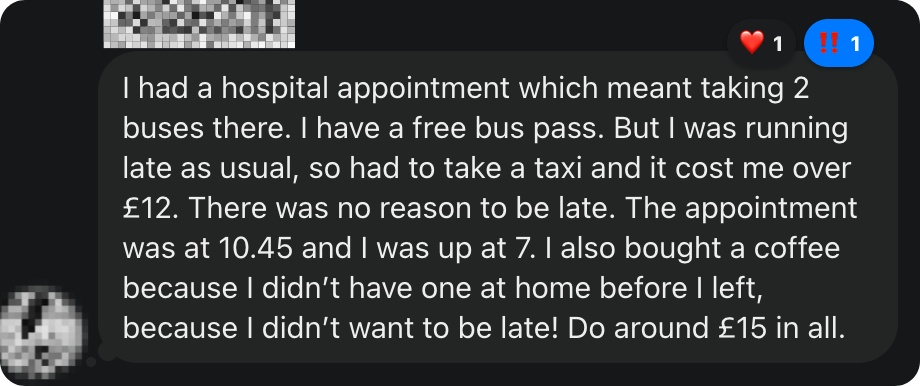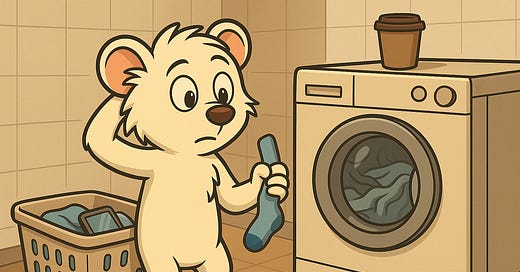ADHD Memory: How to Stop Forgetting Everything!
Learn why ADHD makes memory so unreliable, and what you can actually do about it.
You forget birthdays, appointments, and half the things you swore you'd remember. In the moment, it feels obvious - how could you not remember to move the laundry? But then your phone lights up. A notification, a text, a scroll. Five minutes later, the thought is gone. Skip to Monday: your favorite shirt’s still in the washer, and now it smells like regret.
If you’ve ever felt like your brain just… drops things, you're not irresponsible or careless. ADHD messes with memory in sneaky ways: working memory, short-term recall, even remembering to remember. Today we’re unpacking why ADHD makes memory so unreliable, and what you can actually do about it.
Don’t miss the ‘Apply It’ Worksheet at the end - it’ll help you actually remember the stuff that matters, starting today.
Why thoughts just slip away
Below the surface, there are specific patterns - ways the brain handles (or fumbles) memory that make these everyday slips more predictable than they seem. Let’s break it down.
Working memory is like your brain’s mental notepad. It holds onto little bits of info just long enough to use them. But for ADHDers, this notepad is smudged and easy to lose track of. You might walk into the kitchen, forget why you’re there, or read a recipe and immediately forget step two while doing step one. It’s your brain struggling to juggle and update information in real time, even though basic short-term memory might still work fine. This is why multi-step tasks feel so slippery, and why the fire alarm ends up doing the remembering for you.
Episodic memory is your brain’s way of remembering things that happened - like a conversation from yesterday or what you did last weekend. Many ADHDers struggle with this kind of memory, but not because the memories disappear. The issue is often with how the brain stores those moments in the first place. Studies show that when ADHDers learn something well, they can remember it just fine. The problem is that the learning process itself tends to be patchy. ADHD brains don’t always use helpful strategies like organizing or visualizing new info unless someone points it out. But once they do use those strategies, memory gets a lot better.
Prospective memory is what helps you remember to do things later - like taking meds, switching the laundry, or showing up to a meeting. ADHDers often struggle here, especially with things tied to time (like “start this in 20 minutes”). Research shows this kind of memory slip plays a role in procrastination: when the intention to do something doesn’t stick, it never turns into action. You might fully plan to pay a bill after dinner, but the thought quietly drifts away - and by the time you remember, it’s already late.

Long-term memory is what stores information for days, months, even years. ADHD doesn’t always mess with this storage directly - but like we mentioned in the episodic memory section, the learning process is often patchy. So if your brain didn’t use solid strategies when you first learned something, it’s less likely to stick around long-term.
Practical strategies to improve your day-to-day
Unfortunately, we can’t just slice open the brain, rewire a few loose ends, and unlock unlimited memory with 0% forgetfulness. But don’t click away just yet - based on what we know about how ADHD affects memory, there are strategies you can start using today to hold onto the important stuff.
Alarms as Prosthetic Memory. Your phone can handle every “don’t forget” for you - if you set alarms that are specific and sparing. Two rules: make the label crystal clear (“Take med + water” beats “Pill”), and give yourself a backup alarm if you can’t act right away. You remove the mental gymnastics of “remember to remember.” People who use timed cues like this miss far fewer doses, bills, and birthdays than those trying to just remember on their own.
“If-then” Anchors. Turn future tasks into “if-then” plans to help your brain follow through. For example: “If it’s 9 PM, then I’ll take my meds,” or “When I get to work, I’ll check my calendar.” Boost your chances of follow-through by saying it out loud, writing it down, or picturing yourself doing the action in the actual context. Studies call these “implementation intentions,” but it’s really just glue for forgetful brains.
Meditation. Practicing mindfulness (even just 5 minutes a day) can help strengthen your brain’s ability to focus and remember what you're doing. Try sitting quietly and focusing on your breath, gently bringing your mind back whenever it drifts. A study showed that eight weeks of mindfulness meditation training led to improved working memory performance. Think of it like mental cross-training: it calms the hyperactive mind and strengthens the neural circuits that keep you on task.
Make It Weird, Make It Stick. Turn dry facts into loud mental pictures. Need to remember to send Sara the invoice? Picture Sara surfing a giant receipt down a wave. The brain loves oddball visuals - mnemonic tricks like the Method of Loci can double recall after a little practice. For your next grocery run, try five items and a silly mental image for each one - the more vivid and ridiculous, the better it’ll stick.
Move First, Think Better. A 15- to 30-minute “huff-and-puff” walk, bike ride, or dance break floods your prefrontal cortex with oxygen and dopamine. Studies show even light cardio bumps working memory scores the very same day. Think of it like a brain warm-up: getting your body moving gives your working memory a boost that lasts for hours.
Protect Sleep like a Prescription. Consistently getting 7–8 hours of sleep is the easiest way to keep your focus sharp and your memory running smoothly. Sleep is crucial for the offline processing that solidifies memories, and addressing sleep has been shown to boost attention and memory the very next day. You can read our newsletter on how to build a sleep routine here.
Dive into our ‘Apply It’ worksheet (Paid Subscriber Perk)
Before you scroll away and forget all this (ouch, too soon?), take five minutes to fill out the worksheet below. It’s a quick way to put these memory strategies into action - right now, while it’s fresh. It’s short, doable, and designed with ADHD brains in mind. Use it to start with one smart alarm, one silly mental image, one tiny win. Small steps today = less forgetting tomorrow.
How did you enjoy our newsletter today?
If this read helped your brain feel a little less tangled, pass it on: a like, comment, restack, or share helps more ADHDers thrive and feel less alone :)





